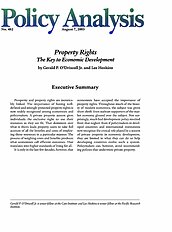Prosperity and property rights are inextricably linked. The importance of having well-defined and strongly protected property rights is now widely recognized among economists and policymakers. A private property system gives individuals the exclusive right to use their resources as they see fit. That dominion over what is theirs leads property users to take full account of all the benefits and costs of employing those resources in a particular manner. The process of weighing costs and benefits produces what economists call efficient outcomes. That translates into higher standards of living for all.
It is only in the last few decades, however, that economists have accepted the importance of property rights. Throughout much of the history of modern economics, the subject was given short shrift. Even stalwart supporters of the market economy glossed over the subject. Not surprisingly, much bad development policy resulted from that neglect. Even if policymakers in developed countries and international institutions now recognize the critical role played by a system of private property in economic development, they are limited in what they can do to help developing countries evolve such a system. Policymakers can, however, avoid recommending policies that undermine private property.
About the Authors

This work is licensed under a Creative Commons Attribution-NonCommercial-ShareAlike 4.0 International License.
